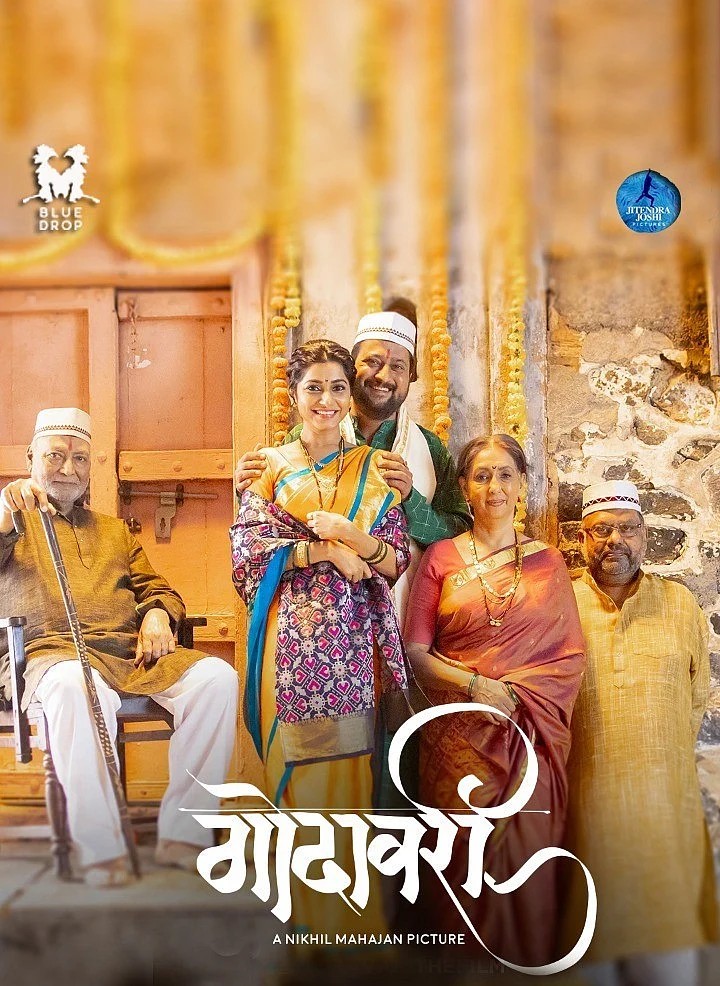'Godavari': Intimations of mortality
Nikhil Mahajan’s upcoming Marathi film, Godavari, with Jitendra Joshi in the lead, is about an individual’s crisis of faith and how death brings him back home to life

Nashik is where some sections of the Hindus in Maharashtra perform last rites of the dead. Godavari, the river running through the pilgrim town, isn’t just the title of filmmaker Nikhil Mahajan’s third feature film but also becomes the keeper of its themes—the march of time, past, present and future, of traditions and legacies, fathers and sons, relationships and families, pollution and ecological disasters, redevelopment and modernization and most so about the eternal circle of life and death. As Jitendra Joshi, the producer and lyricist of the film, who also plays the protagonist Nishikant, sums it up: people on its banks may light a diya or immerse the ashes, they may take birth or die by its side, but the river keeps flowing forever.
Godavari had its world premiere at the Vancouver International Film Festival, plays at the New Zealand International Film Festival in November before releasing commercially in India in December.
For Mahajan the recce for the film that took him to Nashik also turned out to be his first visit to the town, and he wanted to embrace the space in its entirety, including its Hindu centricity which he describes as a part of the entire eco-system. But for him the film is not religious so much as a spiritual quest. “It was never about religion... It is about what happens to a man—Nishikant—who is absolutely lacking in faith—not just religious but faith in relationships, family, the river. It is about how the experience of two deaths colludes in making him find his faith,” says Mahajan. In a nutshell, it is about an individual’s existentialist crisis and how death brings him back home to life.
For all its metaphysical dimension and the timeless wisdom that Godavari offers, it took off from Mahajan’s simple desire initially of making a “cancer comedy”. He wanted to do a death film which was “anti Kal Ho Na Ho”, one in which the protagonist on the death bed was not an angel but a flawed guy.
Godavari’s protagonist is named after a close friend of Mahajan and Joshi, filmmaker-actor Nishikant Kamath, who passed away last year. In fact, the idea to embark on the specific project finally took roots on the day he died, August 17, 2020. “It’s poetic justice that the film’s DCP was ready a year later, on August 16, 2021, at 9.30pm,” says Joshi.
In the pulsating opening credits, set to the song Bhokadi (translates as ghost) that Joshi refers to as a “collage of words”, we are introduced to Nishikant walking through the streets of Nashik, collecting rent for his family of landowners. As one moves further into the film, one finds it segueing rather well with the traditional metaphor of our mortal bodies being temporary homes, rented by the eternal souls in their journey through earth.
Nishikant is a sum of many negative traits—an argumentative, questioning, combative, embittered, disagreeable guy, unable to even live together with his own immediate family, staying on his own, away from his wife and child, mother, father and grandpa. A complex character who Joshi interprets with an astounding depth, clarity and focus, but without quite trying to find out why he is what he is, why he is combusting within. Joshi didn’t seek answers to any questions about him. The intent was not to solve the puzzle that Nishikant is but to be focused on the fire engulfing him from within. It helped that under Mahajan’s baton Joshi could find the “pregnant silence” on the sets that every actor deserves to get centred within and put her/his best foot forward.
“We look but don’t see, we hear but don’t listen,” says Joshi. So, for him it is important to read Nishikant from his silence and the pain in his eyes. He calls his character “gusse ka kaarkhana” (factory of anger) that keeps spewing and spreading hatred. All for not having been able to find love from the world at the right juncture in his life.
Mahajan, on his part, also deliberately didn’t weave in a backstory for Nishikant. “I wanted the audience to not empathise with the protagonist yet not disconnect from the film either,” he says.
He wanted his filmmaking to also be like sitting by the riverbank, allowing the viewer to observe Nishikant’s world from a distance, objectively, without being involved. “I framed the film as though we are looking into the family without getting into their space,” says Mahajan.
Mahajan’s visuals and soundtrack have the fluidity of the river and the ache and melancholy that are inextricably linked with the idea of mortality. The film is brimming over with shattering moments of pain, loss, grief and the search for elusive closures, peace and equanimity. They overwhelm you even more with the matter-of-fact way that they play out. Like Nishikant and each of his family member’s reconciliation with a death that they had never been prepared for. “They don’t cry par sweekar kar lete hain (they accept it),” says Joshi. The only question that Nishikant has is simple but complicated at the same time: “When my ashes are immersed in Godavari, will the river convey my passage to you?” Life and death, after all, are in a ceaseless flow, so is the endless human search for salvation. And Godavari is a colossal witness to it.
Also Read: 'Sardar Udham': A dedication to dissent
Follow us on: Facebook, Twitter, Google News, Instagram
Join our official telegram channel (@nationalherald) and stay updated with the latest headlines
Published: 21 Oct 2021, 7:30 PM
